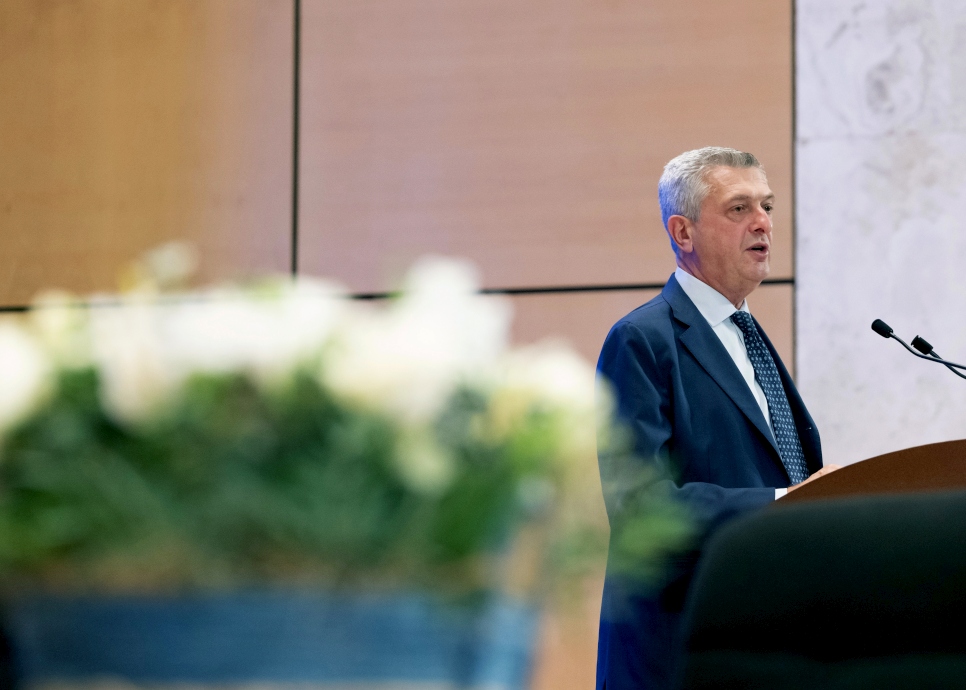'Bigger, broader' vision needed to tackle forced displacement – UN refugee chief
A more ambitious international approach is needed to address contemporary drivers of displacement, Filippo Grandi tells high-level meeting.

UN High Commissioner for Refugees Filippo Grandi addresses delegates at the 70th session of UNHCR's Executive Committee in Geneva. © UNHCR/Jean Marc Ferré
GENEVA – A “bigger, broader” international response is needed to tackle global forced displacement in a world in which new challenges are emerging, the UN High Commissioner for Refugees told a high-level meeting today.
Current drivers for displacement include resource-based conflicts that transcend borders and conflicts premised on ethnic and religious differences, Filippo Grandi told UNHCR’s annual Executive Committee gathering in Geneva.
Grandi highlighted the growing impact of climate change, noting that collapsing eco-systems and weather-related disasters are already destroying homes and livelihoods, and can contribute to conflict and insecurity.
While the term “climate refugees” is not based in international law, and does not reflect the many ways in which climate interacts with human mobility, Grandi noted that it has rightly captured public attention.
He also cited damaging forms of nationalism, and hate speech that has found a new legitimacy in public discourse.
“Refugees emerge from these widening fault lines – a warning of things going wrong,” Grandi told the opening session of the 70th session of the Executive Committee, which runs through Friday.
“This is why tackling forced displacement calls again for a bigger, broader ambition than we have managed to muster in the recent past,” he added.
"Tackling forced displacement calls again for a bigger, broader ambition."
Grandi stressed that addressing refugee crises could not be done “in isolation from larger global challenges, and from effective migration policies,” as set out in the complementary Global Compact on Refugees and the Global Compact for Migration, that were affirmed by the UN General Assembly last year.
Grandi highlighted the Global Compact on Refugee’s acceleration of a long-awaited shift in responses – to one that preserves and matches the humanitarian response “with a broader set of tools more adapted to the dynamics of today's refugee flows.”
“This means peacemaking and peacebuilding, development action and private sector investment. It means sustained, strategic support to address the root causes of refugee movements and mixed population flows.”
The High Commissioner identified seven key challenges to be tackled, as global displacement reached a record high of 70.8 million people last year.
These included the need for more substantial and sustained international support for refugee hosting countries, most of which are in the global south. In that context he cited the “commendable solidarity” shown to more than four million Venezuelans by 14 nations in Latin America and the Caribbean, “despite immense pressures.” He also called for support to the countries neighbouring Syria that are generously hosting almost six million refugees.
In response to a divisive debate that frequently exploits anxieties over mixed flows or refugees and migrants, Grandi cautioned against measures to reduce flows through policies of deterrence.
“Saving lives and safeguarding the dignity and rights of all those on the move must remain central."
“Saving lives and safeguarding the dignity and rights of all those on the move must remain central, together with access to international protection for those with valid claims,” he said.
The High Commissioner also commended the actions of countries in the East and Horn of Africa, who are working to include refugees in health and education systems and their economies, in line with the Global Refugee Compact, while longer-term solutions are pursued.
He also highlighted the need for development action in support of host countries. This was particularly needed in protracted situations such as that faced by Afghan refugees, some 2.6 million of whom remain out of their homeland nearly 40 years after the Soviet invasion.
Grandi noted the hospitality shown by Pakistan and Iran. He stressed that their work on refugee inclusion and self-reliance, as well as on legal migration and stay options, are ground-breaking, “but must receive more international support while the Afghan crisis continues.”
The High Commissioner also called on States to make sure that “refugee choices, and refugee voices” are at the centre of discussions around voluntary repatriation. These must be “driven by people, not politics” he said. He highlighted the need to seize opportunities to accelerate solutions, including for the internally displaced, of whom over 41 million people were living within the border of their own countries at the close of last year.
Speaking to the issue of statelessness, he noted that UNHCR’s ten-year #IBelong campaign had now reached its half-way mark, and that important achievements had already been secured. He encouraged States and partner agencies to step up their efforts to eradicate statelessness.
“This is an area in which – for relatively little investment – wide-reaching impact is within our reach,” he concluded.
